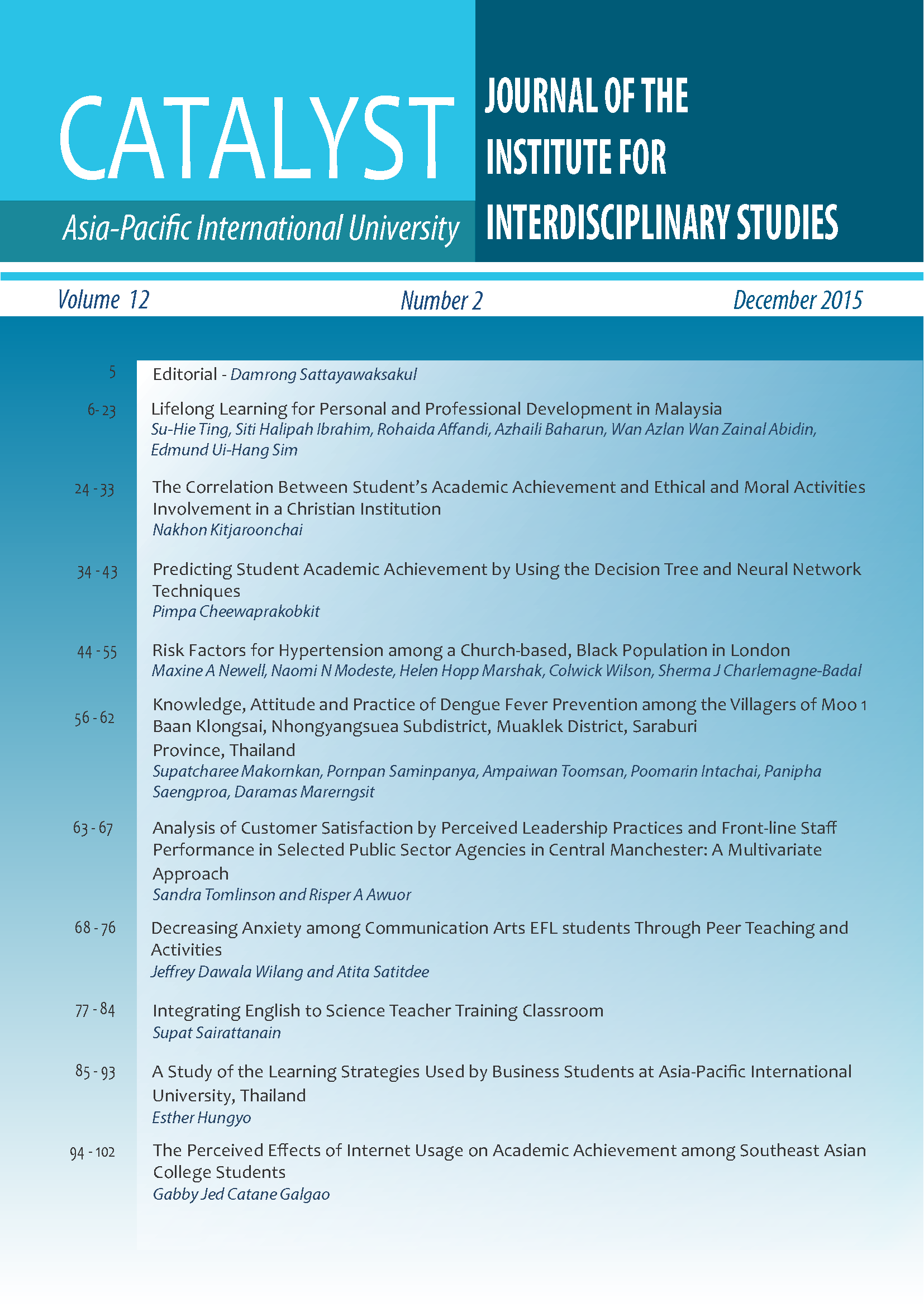The Correlation between Students’ Academic Achievement and Ethical and Moral Activities Involvement in a Christian Institution
Main Article Content
Abstract
This study investigates the correlation between students’ academic achievement and their involvement in ethical and moral activities. The sample of the study was 472 students from Asia-Pacific International University, Thailand, who were enrolled in different programs in the second semester of the academic year 2013-2014. Data were obtained from the internal software created by the IT department at Asia-Pacific International University called System for Administration, Reports, Requests and Academics. Data were analyzed using One-way ANOVA to examine significant difference between students’ academic achievement and their participation in ethical and moral activities. Pearson Product Moment Correlation Coefficient (Pearson’s r) was used to analyze the correlation between students’ academic achievement and their ethical and moral activities involvement. The study revealed that there was a statistically significant difference between students academic achievement and their involvement in ethical and moral activities at a = 0.05. The findings of the study also revealed that there was also a statistically positive correlation between students’ academic achievement and their involvement in ethical and moral activities (r-value = 0.447, p-value = 0.000 at a = 0.01).
Article Details

This work is licensed under a Creative Commons Attribution-NonCommercial-NoDerivatives 4.0 International License.
Copyright: Asia-Pacific International University reserve exclusive rights to publish, reproduce and distribute the manuscript and all contents therein.
References
Adeyemo, S. A. (2010). The relationship between students’ participation in school extracurricular activities andtheir achievement in physics. International Journal of Science and Technology Education Research, 1(6), 111-117.
Broh, B. A. (2002). Linking extracurricular programming to academic achievement: who benefits and why? Sociology of Education. 75, 69-96.
Chip, F., Cynthia, H.,& Jane, J. (2003). Improving student achievement through character education. Master of Arts Action Research Project, Saint Xavier University and SkyLight Professional Development Field-Based Master’s Program. Retrieved March 22, 2015, from http://files.eric.ed.gov/fulltext/ ED477142.pdf
Erickson, L.D. & Phillips, J. W. (2012). The effect of religious-based mentoring on educational attainment: more than just a spiritual high? Journal for the Scientific Study of Religion, 51(3): 568-587.
Fujita, K. (2005). The effects of extracurricular activities on the academic performance of junior high students. Retrieved May 15, 2015, from http://www.kon.org/urc/v5/fujita.html
Gert, B. (2012). The definition of morality. Stanford Encyclopedia of Philosophy. Retrieved March 3, 2015, from http://plato.stanford.edu/entries/morality-definition/
Guseinov, A.A. (2014). The golden rule of morality. Russian Social Science Review, 55(6). 84-100.
Huang, Y.& Chang, S. (2004). Academic and co-curricular involvement: Their relationship and the best combinations for student growth. Journal of College Student Development, 45, 391-406.
Jeynes, W. H. (2003). Religion, education, and academic success. Greenwich: information age.
Jeynes, W. H. (2007). Religion, intact families, and the achievement gap. Interdisciplinary Journal of Research on Religion, 3, 1-24.
Kitjaroonchai, N. & Kitjaroonchai, T. (2012). Motivation toward English language learning of Thai students majoring in English at Asia-Pacific International University. Catalyst, 7(1), 21-40.
Luco, A. (2014). The definition of morality: threading the needle. Social Theory and Practice, 40(3), 361-387.
Malti, T., Keller, M., & Buchmann, M. (2012). Do moral choices make us feel good?: the development of adolescent’s emotions following moral decision making. Journal of Research on Adolescence, 23(2), 389-397.
Marsh, H.W.,& Kleitman, S. (2002). Extracurricular activities: the good, the bad, and the nonlinear. Harvard Educational Review, 72, 464-512.
Metsapelto, R.L.,& Pulkkinen, L. (2012). Socioemotional behavior and school achievement in relation to extracurricular activity participation in middle childhood. Scandinavian Journal of Education Research, 56(2), 167-182.
Mooney, M. (2010). Religion, college grades, and satisfaction among students at elite colleges and universities. Sociology of Religion, 71(2), 197-215.
Morality. (1995). In Oxford advanced learner’s dictionary (5th edition). UK: Oxford University Press.
Morality. (2015). In Online business dictionary.com. Retrieved March 3, 2015, from http://www.businessdictionary.com/definition/morality.html
National Qualifications Framework for Higher Education in Thailand. (2006). Bangkok.
Nedley, N. (2010). Adventist youth conference: How to enhance your intelligence. [3ABN]. Australia. Office of National Educational Standards and Quality Assessment. (2014). Bangkok.
Pornrungroj, C. (2014). The quality of students is a reflection of teacher quality. Bangkok: The office for national education standards and quality assessment.
Proverbs 9:10 – New International Version. Retrieved May 10, 2015, from http://biblehub.com/niv/ proverbs/9-10.htm
Puntachai, S. & Khamawattana, P. (2012). A study on the desirable characteristics of bachelor’s of engineering graduates from the viewpoint of employers. Online Journal of Education, 7(1), 518-528. Retrieved March 4, 2015, from http://www.edu.chula.ac.th/ojed/doc/V71/v71d0038.pdf
Sellmann, J.D. (2009). Buddhist morality and trans-morality. The International Journal of the Asian Philosophical Association. 1(2), 62-72.
Stiff-Williams, H. R. (2010). Widening the lens to teach character education alongside standard curriculum. The Clearing House, 83: 115–120.
Strapp, C.M., & Farr, R. J. (2010). To get involved or not: the relation among extracurricular involvement, satisfaction, and academic achievement. Teaching of Psychology, 37, 50-54.
Sumari, M., Hussin, Z., Siraj, S. (2010). Factors contributing to academic achievement and moral development: A qualitative study. The International Journal of Research and Review, 5(2), 18-23.
Wang J. & Shively J. (2008). The impact of extracurricular activity on student academic performance. Retrieved April 28, 2015, from http://www.csus.edu/oir/Research%20Projects/Student%20Activity% 20Report%202009.pdf
White, E.G. (1903). Education. Mountain View, CA: Pacific Press Publishing Association


